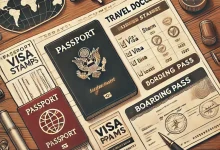Understanding different kind of visa
Visas are official documents issued by countries to allow foreign nationals to enter, stay, or work in their respective territories. There are various types of visas, each designed for different purposes and durations. But understanding the kind of visa to apply is the most paramount aspect of it. There are various categories of visa which we’ll explain and the most suitable people that fits in it.
Tourist Visa:
This type of visa is issued to individuals who wish to visit a country for tourism, leisure, or vacation purposes. It generally permits a short-term stay and may have restrictions on employment. Meanwhile people who can apply for this kind of visa are fun seekers, leisurers, vacationers and people who are on a holiday.
Business Visa:
Business visas are intended for individuals traveling to another country for business purposes, such as attending meetings, conferences, or negotiating contracts. They often allow limited or no employment rights. A business visa is typically intended for individuals who are traveling to a foreign country for business-related purposes. This category of visa is generally available to individuals who are attending meetings, conferences, or negotiations, exploring potential business opportunities, or conducting market research. It may also be applicable to individuals representing a company or organization for contractual agreements or partnerships. Business visas are typically granted to individuals who can demonstrate a legitimate business purpose and provide supporting documentation, such as invitation letters, conference registrations, or proof of business activities.
Work Visa:
A work visa is typically available to individuals who are seeking employment opportunities in a foreign country. It is primarily granted to those who have a confirmed job offer or sponsoring employer in the destination country. The eligibility criteria for a work visa may differ depending on the country’s immigration regulations, but generally require a valid job offer, proof of qualifications or skills. The individual may need to provide documentation such as a contract, a letter of sponsorship, educational certificates, and evidence of sufficient funds for living expenses. Don’t forget to check out articles on How to get UK work permit without a job offer.
Student Visa:
Student visas allow individuals to study in a foreign country for a specific period. Students applying for a student visa must fulfill certain criteria. Typically, individuals who have been accepted to study at a recognized educational institution in another country and can demonstrate sufficient financial means to support themselves during their studies are eligible to apply for a student visa. Other requirements may include health insurance and proof that the individual can speak the countries language proficiently. We also listed Uk student visa and everything you need to know in our previous articles
Family/Dependent Visa:
This visa category allows family members or dependents of individuals residing or working in a foreign country to join them. This can include spouses, children, parents, and sometimes extended family members, such as siblings or grandparents. The specific eligibility criteria and visa regulations may vary across different countries, so it’s important to check the immigration laws of each country.
Transit Visa:
Transit visas are for individuals passing through a country en route to their final destination. They are typically short-term and allow a brief stay within the transit area of an airport or seaport. Transit visa is a short time and most times it’s only given to individuals who are considered of good character.
Refugee/Asylum Visa:
These visas are issued to individuals fleeing their home countries due to persecution, war, or other forms of danger. Refugees and asylum seekers apply for protection and legal status in another country. This are Individuals who have fled their home country due to a well-founded fear of persecution based on factors such as race, religion, nationality, political opinion, or membership in a particular social group may apply for refugee or asylum visas. These visas are typically sought by those who cannot return to their home country due to fear of harm or violation of their fundamental human rights. Eligibility varies by country, but in general, individuals seeking refugee or asylum status must demonstrate their need for protection and satisfy the legal requirements set out by the host country’s immigration and asylum laws.
Diplomatic/Official Visa:
Individuals who may apply for a diplomatic or official visa typically include government officials, diplomats, representatives of international organizations, and other individuals engaged in official government activities. These visas are granted to facilitate diplomatic and official exchanges between countries and generally require endorsement from the sending country’s government or relevant organization.
In Conclusion Please note that visa types, requirements, and names may vary significantly from country to country. It’s essential to consult the official immigration authorities or the embassy/consulate of the destination country you want to apply for it’s visa for accurate and up-to-date information regarding visa options and processes.





